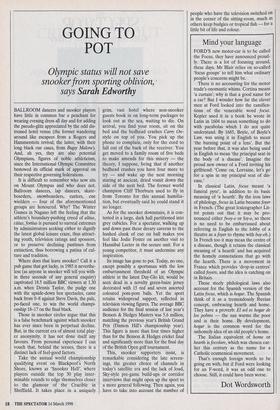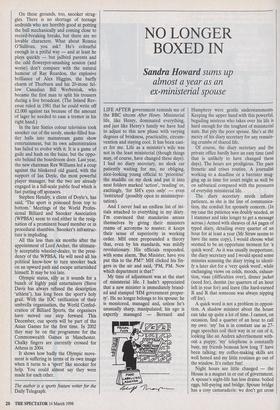GOING TO POT
Olympic status will not save
BALLROOM dancers and snooker players have little in common bar a penchant for wearing evening dress all day and for adding the pseudo-glitz appreciated by the odd dis- tressed hotel venue (the former wandering around like escapees from a Rogers and Hammerstein revival; the latter, with their long black cue cases, from Bugsy Malone). And, ah yes, they are also potential Olympians, figures of noble athleticism, since the International Olympic Committee bestowed its official mark of approval on their respective governing federations.
It is difficult to remember who now sits on Mount Olympus and who does not. Ballroom dancers, lap dancers, skate- boarders, snowboarders, curlers, cue wielders — four of the aforementioned groups are honoured. Why? The Winter Games in Nagano left the feeling that the athlete's boundary-pushing creed of altius, citius, fortius is pursued to surreal extremes by administrators seeking either to dignify the latest global leisure craze, thus attract- ing youth, television ratings and sponsors, or to preserve declining pastimes from extinction, thus borrowing a patina of cul- ture and tradition.
Where does that leave snooker? Call it a pub game that got lucky, in 1985 it neverthe- less (as anyone in snooker will tell you with- in three seconds of any general enquiry) captivated 18.5 million BBC viewers at 1.30 a.m. when Dennis Taylor, the pudgy one with the upside-down box spectacles, came back from 0-8 against Steve Davis, the pale, po-faced one, to win the world champi- onship 18-17 on the final black.
Those in snooker circles argue that this is a false benchmark against which snooker has ever since been in perpetual decline. But, in the current era of almost total play- er anonymity, it has not done itself any favours. From personal experience I can vouch that, behind the scenes, there is a distinct lack of feel-good factors.
Take the annual world championship qualifying event on Blackpool's North Shore, known as 'Snooker Hell', where players outside the top 30 play inter- minable rounds to edge themselves closer to the glamour of the Crucible in Sheffield. It takes place in a uniquely grim, vast hotel where non-snooker guests book in on long-term packages to look out at the sea, waiting to die. On arrival, you find your room, sit on the bed and the bedhead crashes Carry On- style on top of you. You pick up the phone to complain, only for the cord to fall out of the back of the receiver. You get moved to a family room of five beds to make amends for this misery — the theory, I suppose, being that if another bedhead crashes you have four more to try — and wake up the next morning staring at ancient, dried vomit down the side of the next bed. The former world champion Cliff Thorburn used to fly in from Toronto for this annual humilia- tion, but eventually said he could stand it no longer.
As for the snooker downstairs, it is con- tested in a large, dark hall partitioned into grey cubicles. For a spectator, walking up and down past these dreary caverns to the hushed clunk of cue on ball makes you feel like Jodie Foster on another visit to Hannibal Lecter in the secure unit. For a young competitor, it must undermine any inspiration.
Its image has gone to pot. Today, no one, except possibly a sportsman with the low embarrassment threshold of an Olympic athlete in the latest Day-Glo kit, would be seen dead in a novelty green-baize jersey decorated with 15 red and seven assorted coloured porn-pom balls. Yet the sport retains widespread support, reflected in television viewing figures. The average BBC audience for the final session of last year's Benson & Hedges Masters was 5.6 million, matching the previous year's British Grand Prix (Damon Hill's championship year). This figure is more than four times higher than for the Benson & Hedges cricket final and significantly more than for the final day of the British Open golf tournament.
This, snooker supporters insist, is remarkable considering the late screen- ings, the greater choice of channels in today's satellite era and the lack of loud, Sky-style pre-game build-ups or corridor interviews that might open up the sport to a more general following. Then again, you have to take into account the number of people who have the television switched on in the corner of the sitting-room, much as others keep budgies or tropical fish — for a little bit of life and colour. On these grounds, too, snooker strug- gles. There is no shortage of teenage androids who are horribly good at potting the ball mechanically and coming close to record-breaking breaks, but there are no lovable characters. What about Ronnie O'Sullivan, you ask? He's colourful enough in a pitiful way — and at least he plays quickly — but jailbird parents and the odd flowerpot-smashing session (and worse) don't compare with the natural humour of Ray Reardon, the explosive brilliance of Alex Higgins, the barfly charm of Thorbum and his 20-stone fel- low Canadian Bill Werbeniuk, who became the first man to split his trousers during a live broadcast. (The Inland Rev- enue ruled in 1981 that he could write off £2,000 against tax because of the amount of lager he needed to ease a tremor in his right hand.) In the late Sixties colour television took snooker out of the seedy, smoke-filled hus- tler halls into mainstream game show entertainment, but its own administration has failed to evolve with it. It is a game of guile and hush on the baize, but the oppo- site behind the boardroom door. Last year, the new chairman Rex Williams led a coup against the blinkered old guard, with the support of Ian Doyle, the most powerful player manager, but the two are already engaged in a full-scale public feud which is fast putting off sponsors.
Stephen Hendry, a client of Doyle's, has said, `The sport is poisoned from top to bottom.' Meetings of the World Profes- sional Billiard and Snooker Association (WPBSA) seem to end either in the resig- nation of a prominent board member or in procedural shambles. Snooker's infrastruc- ture is imploding.
All this less than six months after the appointment of Lord Archer, the ultimate- ly acceptable wheeler-dealer, to the presi- dency of the WPBSA. He will need all his political know-how to turn snooker back on an upward path and escape untarnished himself. It may be too late.
Olympic status, silly as it sounds for a bunch of highly paid entertainers (Steve Davis has always refused the description `athlete), has long been the sport's holy grail. With the IOC ratification of their umbrella organisation, the World Confed- eration of Billiard Sports, the organisers have moved one step forward. This December, cue sports will be part of the Asian Games for the first time. In 2002 they may be on the programme for the Commonwealth Games in Manchester. Chalky fingers are currently crossed for Athens in 2004.
It shows how badly the Olympic move- ment is suffering in terms of its own image when it turns to a 'sport' like snooker for help. You could almost say they were made for each other.
The author is a sports feature writer for the Daily Telegraph.



































































 Previous page
Previous page